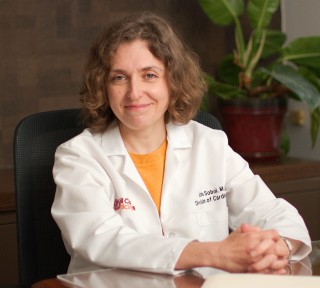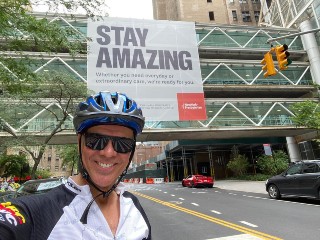A New Heart, New Life for One of Broadway’s Original ‘Cats’
Bob Hoshour nearly lost his life to heart failure. Then his cardiologist, whom he calls ‘Dr. Tender Heart,’ convinced him that a heart transplant would let him reclaim the active life he loved.
Five minutes before showtime, in the middle of gluing on his wig for another performance of “Cats,” Broadway dancer Bob Hoshour was told that he had an urgent call. He rushed to the pay phone by the stage door, answering the call in his Tumblebrutus costume and full makeup.
“It was the doctor that I had seen that morning,” recalls Hoshour, now 65. “He said, ‘Well, I think you’ve either just had a heart attack, or are about ready to have one.’ And I laughed at him, and I said, ‘You know, I feel better than I’ve felt in a long time. I’ve got a show to do.’”
With that, Hoshour hung up the phone and performed, as he had so many times before. That was in 1983.
Turns out Hoshour had an arrhythmia, or irregular heartbeat. His particular case was associated with arrhythmogenic right ventricular dysplasia/cardiomyopathy (ARVD/C), a heart disorder that impacts 1 in 1,000 to 1,250 people, according to the National Institutes of Health.

Dr. Irina Sobol
ARVD/C is mostly caused by weakening in the right ventricle, which can lead to heart failure in otherwise healthy-seeming individuals. Despite the diagnosis, Hoshour maintained his active lifestyle, which included hiking, biking, fishing, and kayaking, on top of performing. In fact, he felt so healthy that he never sought treatment for his ARVD/C — until an emergency room visit more than three decades later led him to the care of Dr. Irina Sobol, a cardiologist and advanced heart failure physician at NewYork-Presbyterian/Weill Cornell Medical Center and an assistant professor of medicine at Weill Cornell Medicine.
‘Minor’ Symptoms Lead to a Major Realization
In 2017, the weekend before Thanksgiving, Hoshour and his wife, Jenise, were at their home in the Catskills, preparing to winterize it. After moving some furniture around, Hoshour had an upset stomach and felt more tired than usual, but wrote it off as a stomach virus or the flu.
When the symptoms didn’t pass for 36 hours, Jenise drove him back to New York City to see a doctor. Hoshour couldn’t keep anything down, so the doctor administered electrolytes via an IV drip, but it didn’t help. “Then the doctor listened to my heart, and he looked at his nurse and said, ‘Dial 911.’ I was diagnosed as having heart failure,” Hoshour says. “My life instantly changed that moment.” Paramedics arrived and rushed him to NewYork-Presbyterian/Weill Cornell Medical Center.
“When I got there, I remember there were all sorts of people around me very concerned, with extremely serious faces,” Hoshour says. Most concerned of all was Jenise. “Bob was ashen gray. I got right in his face and said, ‘You better decide you are living, right now. Because I am not going to become a widow standing in this emergency room,’” she recalls.
Much to his dismay, Hoshour needed to be defibrillated. “I cursed them out rather drastically because in my mind, I still just had a stomach virus,” he says. “But due to what those doctors and what those paramedics did, I lasted that night.” After receiving some initial treatment, he was transferred to the cardiac intensive care unit, where he met Dr. Sobol.
Sobol recalls how deeply in denial Hoshour was. “He had fluid in his belly, he had fluid in his legs. He was pale — and he was desperately trying to convince everybody that he was completely fine,” she says. “Bob was definitely putting himself in danger by ignoring his symptoms and going on with the show, and not coming to address his illness.”
Hoshour now understands how sick he was. “I should not have lived through that weekend,” he says. He continued to see Dr. Sobol as a patient for his heart failure, but after about six months of exploring different treatments and medications, he wasn’t improving.
“It became clear that Bob’s heart was not going to recover through any medical interventions,” Dr. Sobol says. “We knew that his quality of life was not acceptable, and his longevity was not what it should be for a relatively young person. So I started speaking to Bob about having a heart transplant.”
“Anything I want to do now, I can do, because of this gift from a donor who decided to pay it forward and allow this transformation to happen.”— Bob Hoshour
Saying ‘Yes’ to a New Heart
Dr. Sobol believed Hoshour was a prime candidate for a transplant: still fit and active, with no other diseases or conditions to worry about. Although he didn’t believe he was sick enough yet for a heart transplant, he agreed to go through the evaluations necessary to get placed on the waitlist at NewYork-Presbyterian/Columbia University Irving Medical Center in 2018.
This included extensive tests with the care team to ensure the rest of his organs were healthy enough to support such a major surgery. He also met with a psychiatrist and a social worker to ensure he was emotionally and psychologically prepared. Then Dr. Sobol presented his case to the transplant committee — a large team of physicians, psychiatrists, social workers and other clinicians from across NewYork-Presbyterian — who agreed he was a good candidate. That same day, they decided to place him on the waitlist.
Hoshour started attending a monthly transplant support group to learn more about the transplant process and how to care for himself post-transplant, and meet others going through the same thing. “It helped me psychologically deal with the idea of getting ready for this process to happen,” Hoshour says.
But because he was still healthy enough to live a fairly normal life at home, getting a transplant still seemed like a distant reality. That changed the following year when his worsening arrhythmias sent him to the emergency room again. Dr. Sobol told him they needed to escalate his status on the list, which would require checking into the hospital while he waited for a match. “He only had days or weeks to live,” she says.

Within months of his transplant, Bob Hoshour was back to his active lifestyle.
Unprepared for the news, Hoshour immediately got upset. “He remained hopeful that this would be far, far away, not happening right then and there,” Dr. Sobol says. “What I told him was that everything up to now was just a bandage on a broken leg — it was not going to change his trajectory, but a heart transplant would. I said, ‘Bob — you will get your life back.’”
It was those last few words that finally made it click. “To have one or two more years made no difference to me, so to hear ‘You will get your life back,’ meant so much, because that’s all I was interested in,” Hoshour says. He admitted himself into the hospital but, not one to sit idly by, he made it a point to spend his days out of bed. He took hours-long walks around the wing, thanking all the nurses, orderlies and other staff members that helped him every day. And he made it a point to greet other patients and their families to bring a little brightness to their day.
After a few weeks, the day after Father’s Day in 2019, he got the call. “The voice on the other end said, ‘I’d like to offer you a heart. It’s a good heart. Do you want to accept it?’” Hoshour recalls. “And I said, ‘Yes, I am ready to accept this.’”
The next morning, Hoshour was in surgery. Within a few days, he was able to resume his walks around the hospital. Within 10 days, he was discharged, and within a few weeks, “you could not have stopped me,” Hoshour says. The October after his transplant, he participated in a 25-mile charity bike ride, and several months after that, he took a trip with his family to Arizona to hike the Tom’s Thumb trail in the McDowell Mountains.
Paying It Forward With a Full Life
These days, Hoshour continues his active lifestyle, which now includes spreading awareness about organ transplants and donation. He shares his story for advocacy groups and periodically visits the transplant support group. But mostly he lives his life to the fullest in gratitude for the heart he affectionately calls “Babe.”
“What I have been given back is amazing,” Hoshour says. “Anything I want to do now, I can do, because of this gift from a donor who decided to pay it forward and allow this transformation to happen.”
While Hoshour no longer sees Dr. Sobol as a patient, he continues to email her photos of himself on his latest adventure, whether that’s climbing a mountain or giving a motivational speech. In all their correspondence, he addresses her as “Dr. Tender Heart,” the nickname he bestowed on her years ago when he was still struggling with the idea of a heart transplant.
“He would break down crying, and I would hug him and tear up, and he would say, ‘Ah, so you are Dr. Tender Heart.’ The nickname is really a testament to the special relationship we form with our patients that can last for years,” says Dr. Sobol, who is part of the newly expanded team at the heart transplant program at NewYork-Presbyterian/Weill Cornell Medical Center. “The best part about being a heart failure doctor is seeing our patients get better. They always ask me about life after transplant, ‘Will I be able to do this, can I do X, Y, Z again?’ And very often, my answer is, ‘The sky is the limit.’”
Expanding Access to Heart Transplants
Over the last decade, the number of heart transplants performed in the United States has grown steadily. According to the United Network for Organ Sharing, a record 3,817 were performed in 2021, adding up to more than 31,000 over the past 10 years, with more than 2,100 of those in New York alone.
To continue to help meet the need for heart transplants, NewYork-Presbyterian has expanded its renowned heart transplant program from NewYork-Presbyterian/Columbia University Irving Medical Center to NewYork-Presbyterian/Weill Cornell Medical Center. In addition, the hospital is expanding heart failure services across the region, particularly in Brooklyn and Queens, to provide easier access to exceptional cardiac care.
“For 45 years, we’ve been advancing heart transplant care so patients can live longer and enjoy a better quality of life,” says Dr. Nir Uriel, director of advanced heart failure and cardiac transplantation at NewYork-Presbyterian, a professor of medicine in the division of cardiology at Columbia University Vagelos College of Physicians and Surgeons, and an adjunct professor of medicine in the Greenberg Division of Cardiology at Weill Cornell Medicine. “We are excited to extend this lifesaving care to a broader population.”
Learn more about heart transplant and heart failure services at NewYork-Presbyterian.

